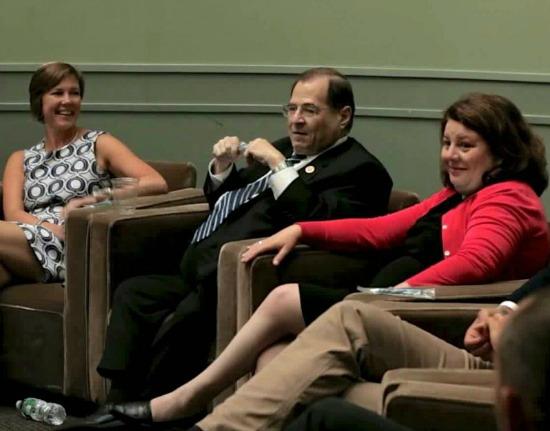Kernochan Center for Law, Media, and the Arts Co-Hosts Event on Copyright Act
Congressman Jerrold Nadler Attends Event, Which Features Performance by Spin Doctors' Chris Barron and Photographs by Various Artists
New York, July 25, 2013—Just before breaking into a rendition of the 1990s hit song “Two Princes” at an event co-sponsored by the Kernochan Center for Law, Media, and the Arts in Columbia Law School’s Drapkin Lounge, Chris Barron, the lead singer of the alternative rock band Spin Doctors, offered his views on piracy.
People who would never consider stealing an orange from a fruit vendor, he said, seem to have no trouble downloading a song illegally. And that’s a problem for artists like him, who make money off the sales and performance of their music.
Barron said he wrote “Two Princes” about 25 years ago when he moved to New York with $100 to his name. He sang the song as part of a July 2 copyright awareness event organized by the Copyright Alliance, a non-profit, non-partisan public interest and educational organization representing artists, creators, and innovators. The Alliance gathered together artists, attorneys, and Kernochan Center Assistant Director Philippa Loengard ’03 and Executive Director June M. Besek, as well as Congressman Jerrold Nadler, D-NY, for a discussion of copyright issues in advance of an anticipated review of the Copyright Act.
Maria Pallante, register of the U.S. Copyright Office, first urged Congress to pass comprehensive reforms to the law when she delivered the 26th annual Horace S. Manges Lecture at Columbia Law School. Pallante later testified about the need for reforms before the House Judiciary Committee’s Subcommittee on Courts, Intellectual Property and the Internet.
Nadler sits on the subcommittee, and the Copyright Alliance used the July 2 event to encourage him to take a stronger leadership role if the opportunity should arise.
At the event, moderated by Copyright Alliance Executive Director Sandra Aistars, Loengard spoke about the need for the Copyright Act to respond to changes in technology so artists’ rights are protected.
| (left to right) Copyright Alliance Executive Director Sandra Aistars, Congressman Jerrold Nadler, D-NY and Kernochan Center Assistant Director Philippa Loengard ’03 (Photo courtesy of the Copyright Alliance) |
“When the DMCA [Digital Millennium Copyright Act] was first adopted, it was almost already out of date,” she said. “Whatever act we finally adopt has to be as flexible as possible to grow with new technology and new uses of old technology. It’s challenging; I don’t think anyone would say it isn’t. But we have to start a dialogue, and I’m very pleased that we are now doing so.”
Other participants in the event included Kenneth A. Richieri, executive vice president and general counsel of The New York Times Company; Edward J. Klaris, a lecturer-in-law and senior vice president of editorial assets and rights at Condé Nast; and Vincent Misiano, national vice president of the Directors Guild of America. In addition to Barron’s performance, photography by various artists was featured during the discussion in Drapkin Lounge.
